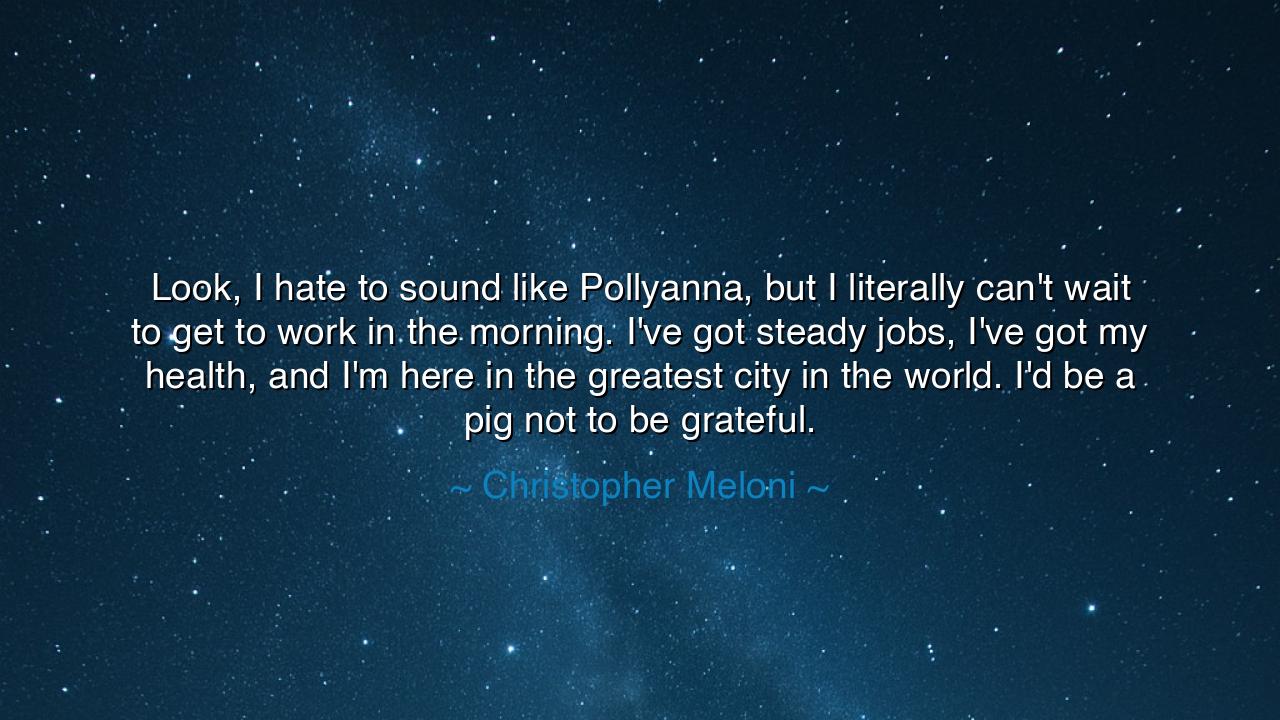
Look, I hate to sound like Pollyanna, but I literally can't wait
Look, I hate to sound like Pollyanna, but I literally can't wait to get to work in the morning. I've got steady jobs, I've got my health, and I'm here in the greatest city in the world. I'd be a pig not to be grateful.






In an age when many rise each morning burdened by dissatisfaction, Christopher Meloni spoke words radiant with gratitude and grounded in humility: “Look, I hate to sound like Pollyanna, but I literally can’t wait to get to work in the morning. I’ve got steady jobs, I’ve got my health, and I’m here in the greatest city in the world. I’d be a pig not to be grateful.” In these words lies not the shallow joy of fleeting comfort, but the deep wisdom of one who understands the sacred art of contentment. His confession is a hymn to the spirit of gratitude—a reminder that the wealth of the soul does not depend upon fortune, but upon awareness.
The origin of this quote lies in the simple, human recognition that joy does not always spring from abundance, but from the ability to see abundance in what already is. Meloni, an actor whose career has spanned hardship and triumph alike, speaks not as one detached from struggle, but as one who has known its weight. His words mirror the ancient teaching that the grateful heart transforms even the smallest blessings into treasure. “I’d be a pig not to be grateful,” he says—and in that jest lies profound humility, the understanding that ingratitude is not only blindness, but a form of arrogance against life itself.
The ancients knew this truth well. The philosopher Epictetus, born a slave, taught that happiness does not depend on what we possess, but on how we perceive what we possess. “He is a wise man,” said Epictetus, “who does not grieve for what he has not, but rejoices in what he has.” So too does Meloni, in modern tongue, echo this Stoic wisdom. To awaken each day with eagerness—to find joy in labor, to honor health, to cherish place—is to live in harmony with life’s natural rhythm. In a world that measures worth by what one lacks, such gratitude is rebellion in its purest form.
His mention of work is no small matter. Many see labor as a burden, yet Meloni speaks of it as blessing. This too recalls an ancient truth: that to have purpose, to have one’s hands and mind engaged in creation, is a gift from the gods. In the myth of Sisyphus, condemned to roll his boulder eternally, the philosopher Camus saw not torment, but triumph. “One must imagine Sisyphus happy,” he wrote, for even endless labor, when embraced with awareness, can become a victory of the spirit. Likewise, Meloni finds joy not in leisure, but in the daily act of rising and giving himself to his craft. It is not the ease of life he praises, but its meaningful toil.
When he names his health and his city, he reminds us that gratitude must be particular, not abstract. It is not enough to say, “I am thankful.” One must see the reasons: the strength of the body, the roof above, the pulse of life in the streets one walks. For every gift unnoticed is a moment unlived. The poet Walt Whitman once declared, “To me, every hour of the light and dark is a miracle.” So too does Meloni live with eyes open to these small, constant miracles—the hum of morning, the promise of creation, the miracle of simply being alive.
There is also in his tone a gentle chastisement—a reminder against cynicism. “I hate to sound like Pollyanna,” he says, aware that modern ears often mock optimism as naïve. Yet what greater foolishness is there than to scorn joy? The ancients called this sin hubris, the pride that sets man above gratitude. In refusing to see the good, one becomes blind to beauty; in rejecting wonder, one banishes peace. Meloni’s humility, by contrast, is wisdom cloaked in laughter. He knows that to be grateful is not to ignore suffering, but to triumph over it.
And so, let us take this teaching as a sacred reminder: gratitude is not weakness—it is strength in its most luminous form. Each morning, as the light returns, remember the gifts that already lie in your hands: your breath, your body, your work, your place in the world. Let not complaint be your first speech of the day, but thanksgiving. For those who begin in gratitude end in grace. The discontented will always hunger, no matter how much they are fed; but the grateful will feast even on simplicity, and find joy enough to last a lifetime.
Therefore, as Christopher Meloni teaches, awaken each dawn as one blessed beyond measure. Go to your work with eagerness, tend to your health with reverence, and love the ground beneath your feet. For the world, when seen through grateful eyes, ceases to be ordinary—and the soul that gives thanks each morning lives already in the kingdom of peace.






AAdministratorAdministrator
Welcome, honored guests. Please leave a comment, we will respond soon